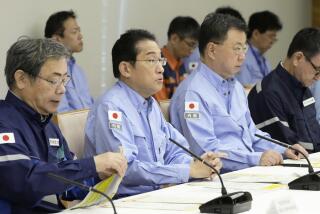Japan Marks WWII Surrender
- Share via
TOKYO — In a conciliatory gesture to Japan’s Asian neighbors, Prime Minister Junichiro Koizumi did not visit a controversial war shrine Thursday as the nation marked the 57th anniversary of its surrender in World War II.
But as Koizumi expressed regrets about Japan’s aggression, conservative lawmakers, including five Cabinet ministers and Tokyo’s right-wing governor, still paid their respects at the capital’s Yasukuni shrine.
Nearly 2.5 million war dead, including executed war criminals, are honored at the shrine.
Koizumi sparked outrage last year, particularly in China and South Korea, when he made a surprise visit days before the surrender anniversary.
This year, Koizumi observed a moment of silence and placed flowers at a nearby cemetery.
Koizumi and Emperor Akihito later attended a staid commemorative ceremony traditionally held at a cavernous martial arts hall outside the stone-lined moats of the Imperial Palace.
“During the war, our country inflicted great damage and pain to the people of many countries, especially in Asia,” Koizumi said. “As the representative of this nation’s people, I again reflect deeply and express humble condolences to those who lost their lives.”
Koizumi also pledged to uphold Japan’s pacifist constitution and foster better relations with its Asian neighbors.
Akihito, dressed in a black tuxedo with tails, and Empress Michiko then bowed in reverence before a vast wall of yellow and white chrysanthemums.
“I feel a new deep sadness thinking of those countless people who lost their precious lives and their surviving families,” Akihito said. “I pray for world peace and the further prosperity of this country.”
To many in China and South Korea, official shrine visits by Japanese lawmakers are a sign that Japan glorifies its militarist era and refuses to atone for wartime atrocities.
China criticized Japan again Thursday.
“The Japanese side should take concrete action to observe honestly and face squarely its history,” Chinese Foreign Ministry spokesman Kong Quan was quoted as saying by the official New China News Agency.
The issue was apparent earlier in the day when a controversial history textbook was adopted for the first time for use in junior high schools.
The books, introduced last year amid protests from Seoul and Beijing, are attacked by critics for allegedly whitewashing Japanese wartime atrocities.
More to Read
Sign up for Essential California
The most important California stories and recommendations in your inbox every morning.
You may occasionally receive promotional content from the Los Angeles Times.













